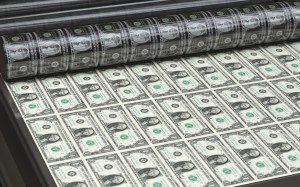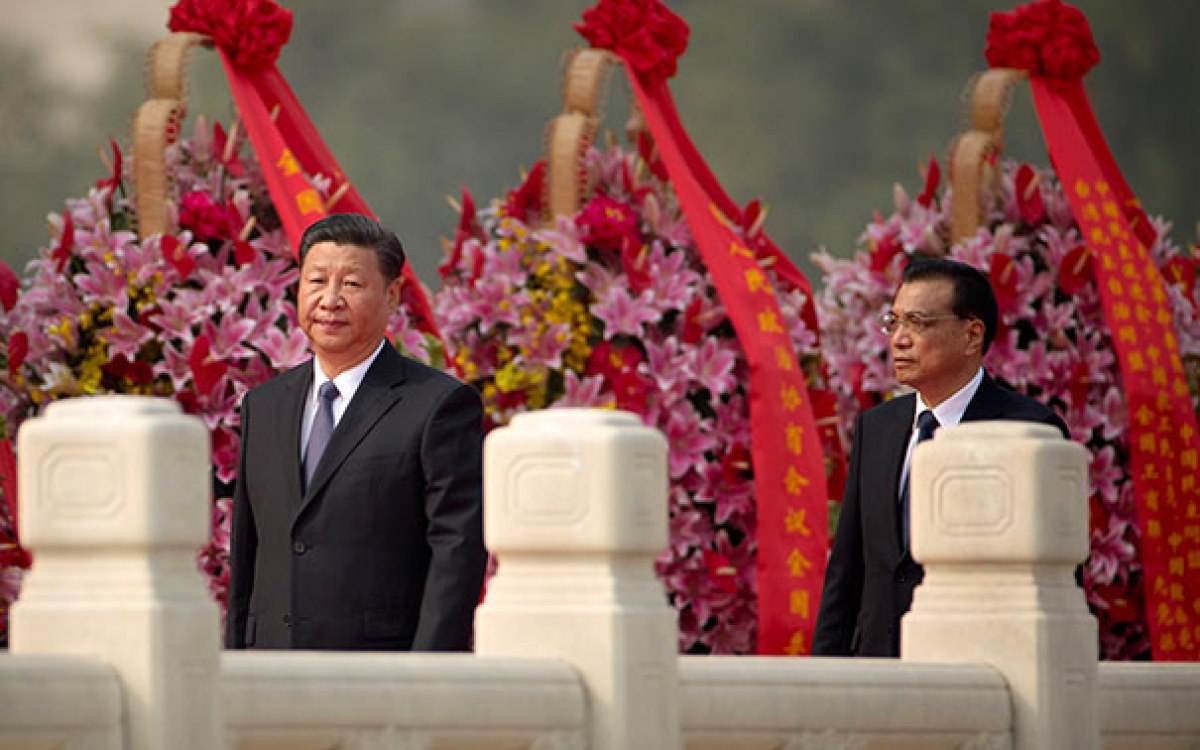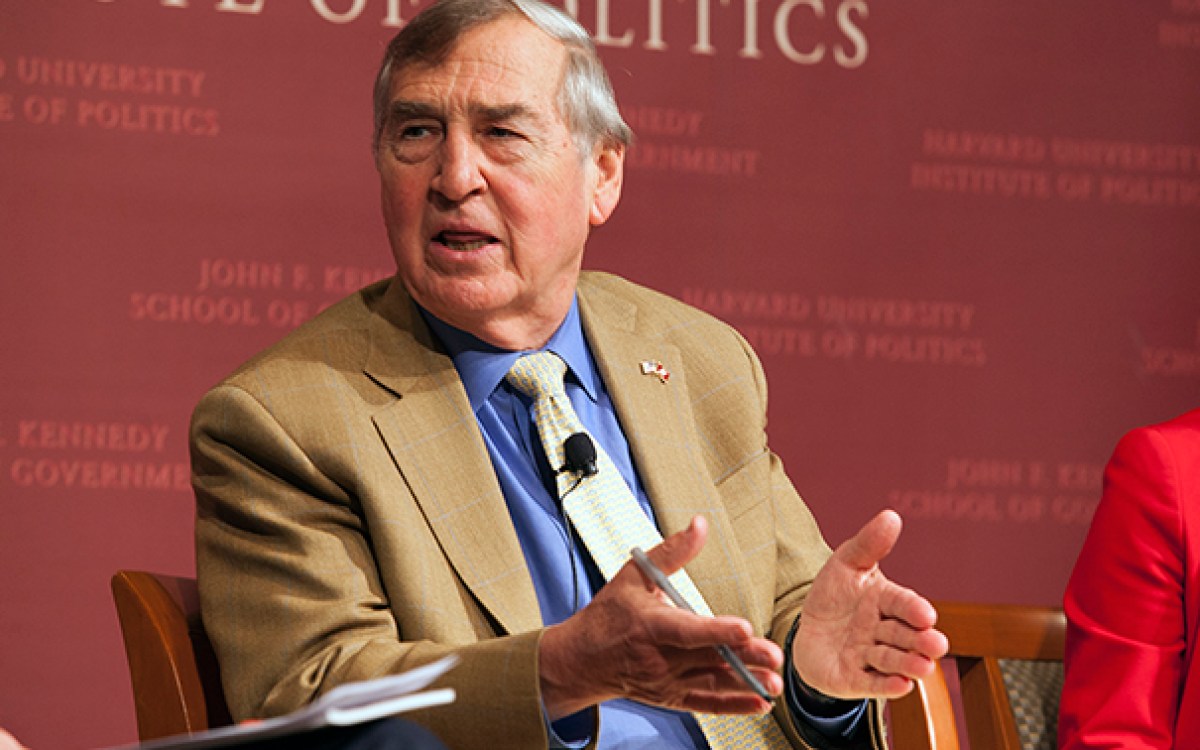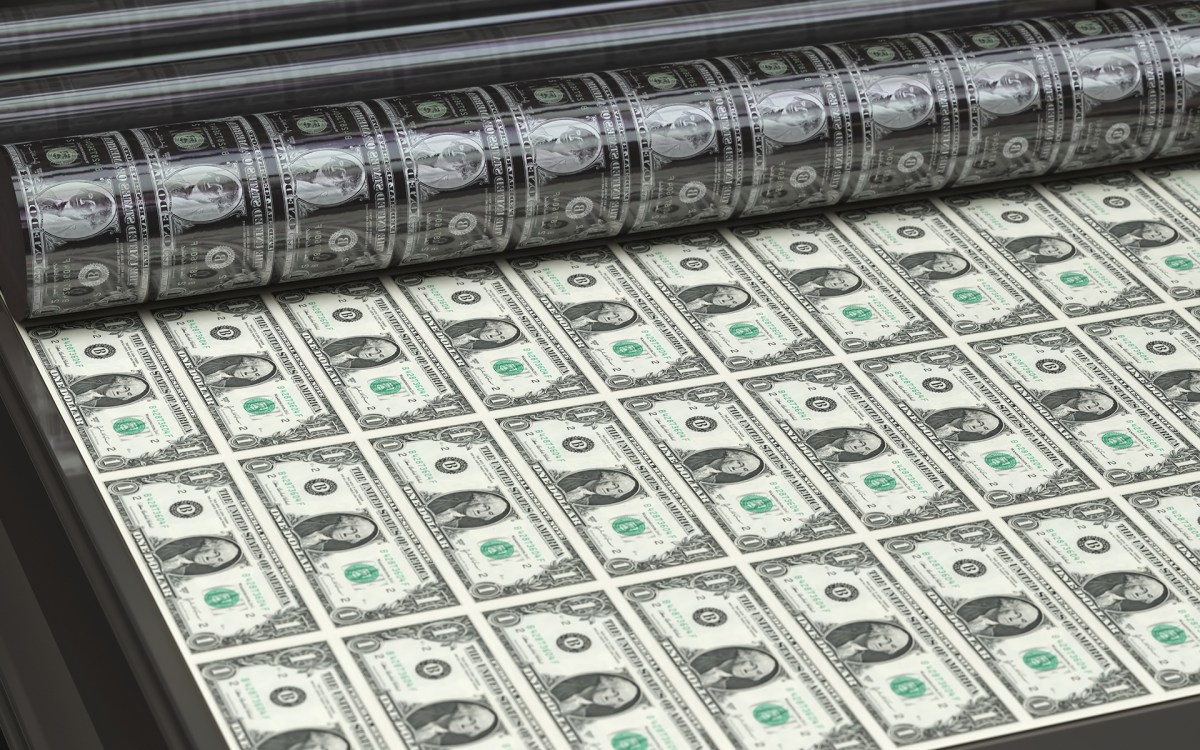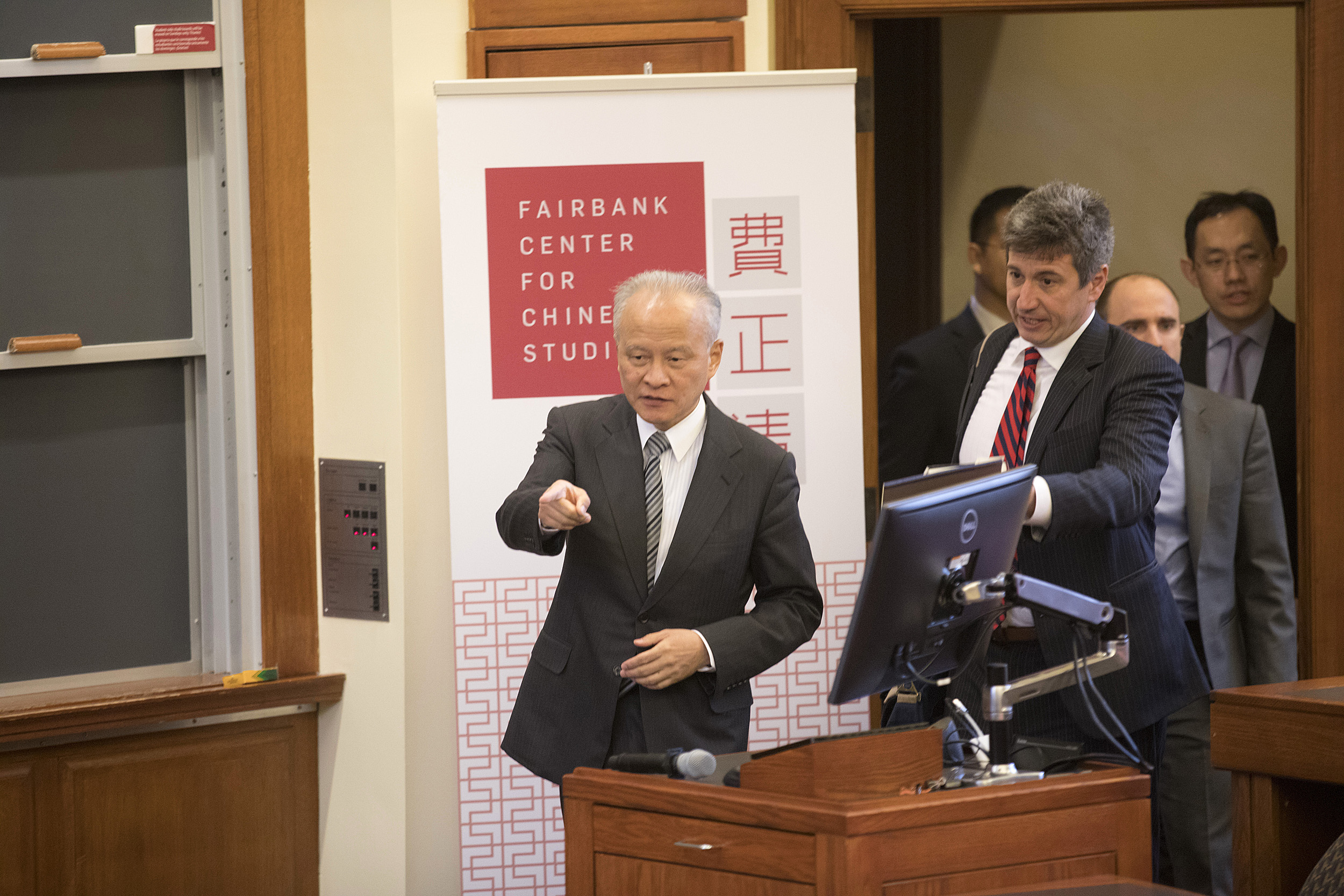
Cui Tiankai, Beijing’s longest-serving ambassador to this country, said a trade war would damage both economies and could undermine global confidence.
Kris Snibbe/Harvard Staff Photographer
The ‘understanding deficit’ between China, U.S.
At Harvard, Beijing’s ambassador downplays prospects of trade war
Against the backdrop of President Trump and the Chinese government slapping tariffs on each other’s goods, a move that threatens to foment a trade war, China’s ambassador to the U.S. said Tuesday that what’s souring relations between the superpowers isn’t the cost of imports and exports, but an “understanding deficit.”
During an address at Harvard Law School about the state of U.S.-China relations, Cui Tiankai, Beijing’s longest-serving ambassador to this country, sought to clear up what he views as misperceptions about China’s true economic and political goals.
During his speech and a discussion with Michael Szonyi, professor of Chinese history and director of the Fairbank Center for Chinese Studies, Cui downplayed talk of a trade war, saying that such a development would not only destroy trade between the two countries, damaging both economies, but could undermine global confidence in both as well.
Cui rejected complaints that China does not offer a level playing field to foreign companies seeking access to its markets and said “some” observers think conditions are stacked unfairly against China.
He also denied that the government forced outside technology companies to hand over their intellectual property as a requirement for doing business in China. There is “no such policy” on the state level, he said carefully, and if such a scenario exists at all, it is “simply a business deal” that companies enter into willingly.
A trade war would “poison the atmosphere” not just on trade and the economy, but potentially on many other issues in which China and the United States are entwined, leading to further problems.

Austin Hall was at capacity for Cui’s address, in which he said the government does not force outside technology companies to hand over their intellectual property as a requirement for doing business in China.
Kris Snibbe/Harvard Staff Photographer
Suggesting that China and the U.S. “hit refresh” on their attitudes toward one another, Cui said there are ample opportunities for the nations to work cooperatively, but whether that happens depends on how they see each other. If everything becomes a zero-sum game, or the U.S. sees “conspiracies” everywhere or fears new China policies like the Belt and Road initiative, then relations won’t thrive, he said.
Two significant pending centennials are the animating events now driving China’s relentless push to modernize, a goal known as “the China Dream,” he said. In 2021, the Chinese Communist Party marks its 100th anniversary, while the People’s Republic of China will celebrate 100 years since its founding in 2049.
China is now in the next phase of economic development, informally known as the “New Era,” he said. It’s mostly domestically focused, where the quality of development is more prized than quantity, and where the national growth and development strategy is not just economic, but includes cultural, social, and ecological development.
And while there are some outward-facing aspects, as one would expect, “This is certainly not a plan for world dominance, it is certainly not China [trying] to replace an old American era which is about to end,” said Cui. “It’s about a proud, great nation [working] to re-emerge in the global center, not to challenge or replace anyone, but to embrace the world and make new contributions to mankind.”
Cui pushed back sharply against the notion that Beijing hopes to shake up the international order, calling it “a gross misperception of China’s intentions.”
He cast China as a staunch supporter of principles set forth in the United Nations charter when it was established after World War II, values like honoring the sovereign equality of member states, peacefully settling disputes, respecting the political independence of other countries, and not interfering in the domestic jurisdiction of member states.
“By contrast, there have been so many violations” of these principles by other nations, in defiance of members of the U.N. Security Council, he said in what may have been an implied criticism of Russia. But he then added that such violations include “chaos and bloodshed … in the name of humanitarian intervention,” which may have been a reference to U.S. involvement in Syria, Iraq, and Afghanistan.

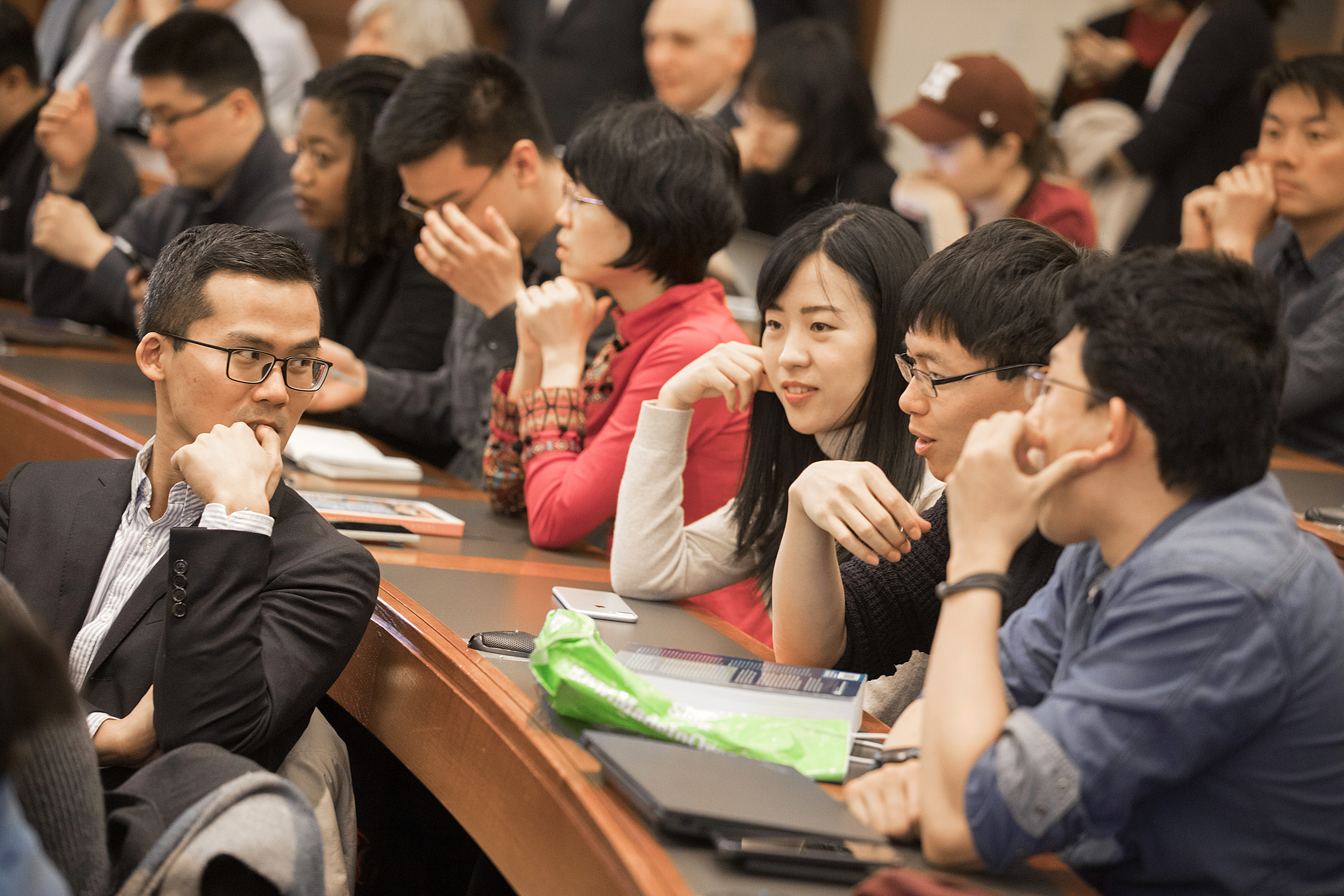
Cui’s speech was followed by a discussion with Michael Szonyi, director of the Fairbank Center for Chinese Studies, as students listened.
Kris Snibbe/Harvard Staff Photographer
“The very people who are responsible for all this are now pointing the finger at others as a revisionist country. Honestly, people should have a better sense of shame,” he said tartly. “I think it is high time for us to review and reaffirm these basic principles so that we could have a better and more effective international order.”
Cui steered clear of several hot-button issues, including China’s questionable record on human rights and free speech, and its buildup of military bases in the South China Sea in apparent violation of international law.
He also avoided addressing the rising backlash among academics, lawmakers, and national security experts over 100 teaching centers sponsored by Beijing that are affiliated with American colleges and universities. Critics say the centers, known as Confucius Institutes, may hinder academic freedom and harbor covert intelligence operatives.
Just hours before news broke that former CIA director Mike Pompeo, J.D. ’94, secretly met with North Korean leader Kim Jong-Un earlier this month in anticipation of a potential summit with Trump, Cui said China hoped that the high-level meeting will take place and yield positive results.
Asked about a controversial amendment to China’s constitution that would abolish the two-term limit on President Xi Jinping, Cui characterized the move as a housekeeping effort “just to synchronize” the Communist Party and the government in order to “avoid confusion.” At a time of great flux and need faced by so many people in China, it’s essential that the government is strong and stable, with leadership that can unite the country, he said. “It’s not our intention to have a life presidency.”
Cui said China “is going through a very challenging period. We cannot turn back, and we cannot afford to have any failure. We must succeed. That’s why the country needs strong leadership.”


